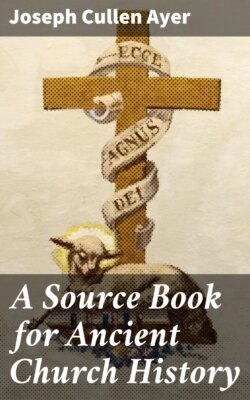Читать книгу A Source Book for Ancient Church History - Joseph Cullen Ayer - Страница 18
На сайте Литреса книга снята с продажи.
(a) Barnabas, Epistula, 4, 9.
ОглавлениеThe epistle attributed to Barnabas is certainly not by the Apostle of that name. Its date is much disputed, but may be safely placed within the first century. The author attempts to show the contrast [pg 015] between Judaism and Christianity by proving that the Jews wholly misunderstood the Mosaic law and had long since lost any claims supposed to be derived from the Mosaic covenant. The epistle is everywhere marked by hostility to Judaism, of which the writer has but imperfect knowledge. The book was regarded as Holy Scripture by Clement of Alexandria and by Origen, though with some hesitation. The position taken by the author was undoubtedly extreme, and not followed generally by the Church. It was, however, merely pushing to excess a conviction already prevalent in the Church, that Christianity and Judaism were distinct religions. For a saner and more commonly accepted position, see Justin Martyr, Apol., I, 47–53 (ANF, I, 178 ff.). A translation of the entire epistle may be found in ANF, I, 137–149.
Ch. 4. It is necessary, therefore, for us who inquire much concerning present events to seek out those things which are able to save us. Let us wholly flee, then, from all the works of iniquity, lest the works of iniquity take hold of us; and let us hate the error of the present times, that we may set our love on the future. Let us not give indulgence to our soul, that it should have power to run with sinners and the wicked, that we become not like them. The final occasion of stumbling approaches, concerning which it is written as Enoch speaks: For this end the Lord has cut short the times and the days, that His beloved may hasten and will come to his inheritance. … 5 Ye ought therefore to understand. And this also I beg of you, as being one of you and with special love loving you all more than my own soul, to take heed to yourselves, and not be like some, adding largely to your sins, and saying: “The covenant is both theirs and ours.” For it is ours; but they thus finally lost it, after Moses had already received it.6
Ch. 9. … But also circumcision, in which they trusted, has been abrogated. He declared that circumcision was not of the flesh; but they transgressed because an evil angel deluded them.7 … Learn, then, my beloved children, concerning all [pg 016] things richly, that Abraham, the first who enjoined circumcision, looking forward in spirit to Jesus, circumcised, the teaching of the three letters having been received. For the Scripture saith: “Abraham circumcised eighteen and three hundred men of his household.” What, then, was the knowledge [gnosis] given to him in this? Learn that he says the eighteen first and then, making a space, the three hundred. The eighteen are the Iota, ten, and the Eta, eight; and you have here the name of Jesus. And because the cross was to express the grace in the letter Tau, he says also, three hundred. He discloses therefore Jesus in the two letters, and the cross in one. He knows this who has put within us the engrafted gift of his teaching. No one has learned from me a more excellent piece of knowledge, but I know that ye are worthy.8
